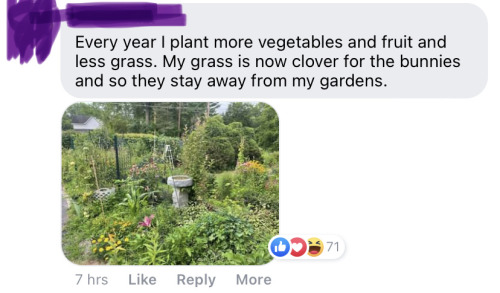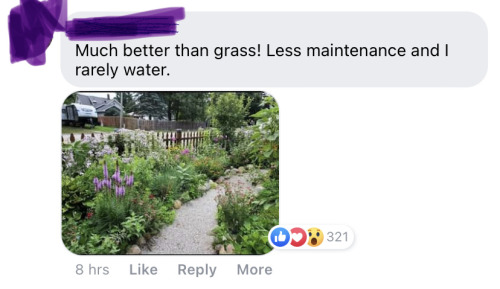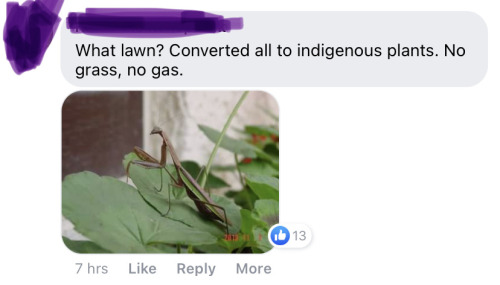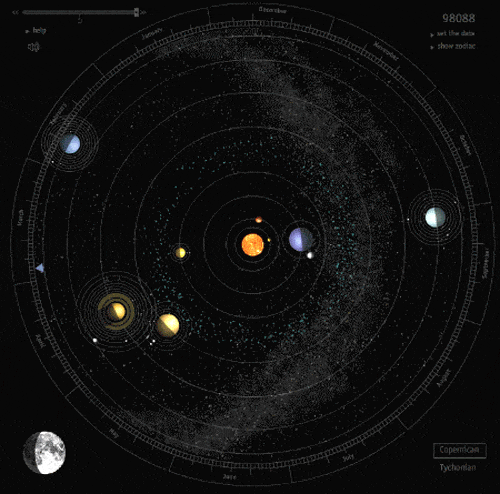Mom Sent Me A Facebook Link To A PBS News Hour Post About How The Anti-lawn Movement Is Growing. The
Mom sent me a facebook link to a PBS news hour post about how the anti-lawn movement is growing. The vast majority of the comments on it were stuff like this:








Most people are on our side here, even the so-called "boomers." We just have to be spreading ecological knowledge and practical means of creating useful habitat in back yards! Educate! Protect! Resist!
More Posts from Goldieslearning and Others
So, I just took the LSAT and got a 171. I had less than 3 months to study because I had to undergo surgery, so I had to prepare concise notes which I used to review questions I was getting consistently wrong.
I thought I'd share my notes for free in the hopes that it helps others:

I am not done uploading everything- I'm currently working on my application. But I'm uploading on a regular basis. And do not hesitate to reach out if you have any questions.
And good luck with your studies!!
Starting College at 24 years old






I’ve made the executive decision to move back home and start college. I am currently 23 and I was a little nervous thinking about going back to college at 24 and thinking I would be too old. Honestly 24 is still super young and age shouldn’t matter when it comes to education. I want a successful career. I’ll blend right in with the other students as well. I am proud of myself for making this decision.
Progress doesn't happen over night, but sometimes if you flip your mindset enough at once it can.
An example:
What if, tomorrow morning, you woke up bright and early. You did skincare and hair care. You made yourself a smoothie, did 20 minutes of yoga, cleaned your house, went to the gym, stretched, made a delicious lunch to take to work, showered, went to work, came home and made a nutritious dinner. Then, you prepped a salad for tomorrow's lunch, slurped downs protein shake, and finished up your laundry. And you soaked your sore feet in Epsom salts and oils and rose petals and you watched your favorite show with a glass of whatever suits you.
Sometimes all it takes, truthfully, is ONE day of saying "I'm doing it" and you actually do it. You actually stick to your lists and your goals and you feel great. And then the next day you feel so great you do it again.
Then the weekend comes, and you look at your to do list going "oh God what didn't I do" and your list was clear. So you go out for coffee with your friends and sit at the park with a book in hand and get excited for tomorrow. Because now you have plans.
Make tomorrow that day.
hate when folk call the Sun “our nearest star” no you dweebs that’s OUR STAR! After everything she's done for you and you want to compare her to some lightyears away ass nobody called some shit like Guncho 785B? We're not spinning eternally around any old ball, we’re three deep in the window on board the Sol Train and she did NOT provide the catering, the itinerary and all the fuel to share credit with some two-bit Proxima Centauri hack. point to these nuts in a constellation while you're at it. i love the sun
My boyfriend's professor doesn't believe I exist, so I sent this email

And his professor responded with this

it’s always amazing to watch adults discover how much changes when they don’t treat their perspective as the default human experience.
example: it’s been well-documented for a long time that urban spaces are more dangerous for kids than they are for adults. but common wisdom has generally held that that’s just the way things are because kids are inherently vulnerable. and because policymakers keep operating under the assumption that there’s nothing that can be done about kids being less safe in cities because that’s just how kids are, the danger they face in public spaces like streets and parks has been used as an excuse for marginalizing and regulating them out of those spaces.
(by the same people who then complain about kids being inside playing video games, I’d imagine.)
thing is, there’s no real evidence to suggest that kids are inescapably less safe in urban spaces. the causality goes the other way: urban spaces are safer for adults because they are designed for adults, by adults, with an adult perspective and experience in mind.
the city of Oslo, Norway recently started a campaign to take a new perspective on urban planning. quite literally a new perspective: they started looking at the city from 95 centimeters off the ground - the height of the average three-year-old. one of the first things they found was that, from that height, there were a lot of hedges blocking the view of roads from sidewalks. in other words, adults could see traffic, but kids couldn’t.
pop quiz: what does not being able to see a car coming do to the safety of pedestrians? the city of Oslo was literally designed to make it more dangerous for kids to cross the street. and no one realized it until they took the laughably small but simultaneously really significant step of…lowering their eye level by a couple of feet.
so Oslo started trimming all its decorative roadside vegetation down. and what was the first result they saw? kids in Oslo are walking to school more, because it’s safer to do it now. and that, as it turns out, reduces traffic around schools, making it even safer to walk to school.
so yeah. this is the kind of important real-life impact all that silly social justice nonsense of recognizing adultism as a massive structural problem can have. stop ignoring 1/3 of the population when you’re deciding what the world should look like and the world gets better a little bit at a time.
A Resource for Reading Practice: The Chinese Reading World

I wanted to share a resource for reading practice that I stumbled across recently. It’s called the Chinese Reading World, and it was a project led by the University of Iowa.
The site was put together from 2005 to 2008, so it’s not super up to date. However, there is a ton of content! Everything is sorted into 3 levels: beginning, intermediate, and advanced.

Each level has 30 units, and each unit has 10 lessons. The lessons begin with a vocab pre-test, then there is a reading with some comprehension questions. Lastly, there is a vocab post-test, which is the same as the initial test (at least for the lessons I’ve done so far). There’s audio for each lesson text, but unfortunately it can’t be streamed—you have to download it. There is also an achievement test at the end of each unit.
My experience has actually been that I already know all the words on the vocabulary tests, but the reading passages contain other words that I’m not familiar with.

So far, the readings I’ve encountered are not very long. This is nice since reading longer pieces can be frustrating at times. With shorter readings, you can just read 1 or 2 on some days and read more when you have more time/patience. I believe the readings are taken from Chinese newspapers.
Also, every unit has a theme. With 90 units total, there are bound to be themes that interest you. Example unit topics:
Directions and Asking Direction 方向和问路
Sports and Outdoor Activities 体育和户外运动
Chinese Music and Musicians 中国音乐和音乐家
Chinese Minorities and Local Customs 地方习俗和民族风情
Chinese Sports and Olympic Games 体育和奥林匹克
Contemporary Chinese Literature and Writers 中国当代文学和作家

The 3 levels also each come with 5 proficiency tests. They seem to be based on vocabulary knowledge, so expanding your vocab is clearly a huge focus of this site. The only thing I’m unclear is about is I’m not sure exactly when the proficiency tests are meant to be taken. After completing all units? Or are they spaced out so you are supposed to take test 1 after the first few units, test 2 after the next few, etc.?

I’ve started working my way through the advanced section this week. With 300 advanced lessons alone, it really feels like I have an infinite number of articles to go through!


The Needle Galaxy, NGC 4565 // galactic_surfer
-
 ohdearymee liked this · 1 week ago
ohdearymee liked this · 1 week ago -
 alexfireon liked this · 1 week ago
alexfireon liked this · 1 week ago -
 blackidentityextremist420 liked this · 1 week ago
blackidentityextremist420 liked this · 1 week ago -
 emmaestrella liked this · 1 week ago
emmaestrella liked this · 1 week ago -
 greenscissors reblogged this · 1 week ago
greenscissors reblogged this · 1 week ago -
 salad-of-potatoes liked this · 1 week ago
salad-of-potatoes liked this · 1 week ago -
 swan-goose-circumstances liked this · 1 week ago
swan-goose-circumstances liked this · 1 week ago -
 theworstcreature reblogged this · 1 week ago
theworstcreature reblogged this · 1 week ago -
 theworstcreature liked this · 1 week ago
theworstcreature liked this · 1 week ago -
 alabastercatfish liked this · 1 week ago
alabastercatfish liked this · 1 week ago -
 fandom-man reblogged this · 1 week ago
fandom-man reblogged this · 1 week ago -
 fandom-man liked this · 1 week ago
fandom-man liked this · 1 week ago -
 clovershroom reblogged this · 1 week ago
clovershroom reblogged this · 1 week ago -
 sister-says-go liked this · 1 week ago
sister-says-go liked this · 1 week ago -
 i-dont-glow-in-the-dark reblogged this · 1 week ago
i-dont-glow-in-the-dark reblogged this · 1 week ago -
 i-dont-glow-in-the-dark liked this · 1 week ago
i-dont-glow-in-the-dark liked this · 1 week ago -
 pur-ugliest reblogged this · 1 week ago
pur-ugliest reblogged this · 1 week ago -
 totally-lyrical reblogged this · 1 week ago
totally-lyrical reblogged this · 1 week ago -
 totally-lyrical liked this · 1 week ago
totally-lyrical liked this · 1 week ago -
 consultingdalekhunter reblogged this · 1 week ago
consultingdalekhunter reblogged this · 1 week ago -
 27ratsinahoodie liked this · 1 week ago
27ratsinahoodie liked this · 1 week ago -
 tacoprophecies liked this · 1 week ago
tacoprophecies liked this · 1 week ago -
 artemisprowls reblogged this · 1 week ago
artemisprowls reblogged this · 1 week ago -
 darklordreasonable liked this · 1 week ago
darklordreasonable liked this · 1 week ago -
 lupineskyes reblogged this · 1 week ago
lupineskyes reblogged this · 1 week ago -
 banchie reblogged this · 1 week ago
banchie reblogged this · 1 week ago -
 banchie liked this · 1 week ago
banchie liked this · 1 week ago -
 certainmoneypapertaco reblogged this · 1 week ago
certainmoneypapertaco reblogged this · 1 week ago -
 lupineskyes liked this · 1 week ago
lupineskyes liked this · 1 week ago -
 toebinkle liked this · 1 week ago
toebinkle liked this · 1 week ago -
 clovershroom liked this · 1 week ago
clovershroom liked this · 1 week ago -
 caramiageek reblogged this · 1 week ago
caramiageek reblogged this · 1 week ago -
 mumble-bun liked this · 1 week ago
mumble-bun liked this · 1 week ago -
 eats-the-stars liked this · 1 week ago
eats-the-stars liked this · 1 week ago -
 shaunashipmn liked this · 1 week ago
shaunashipmn liked this · 1 week ago -
 hellomynameismoo reblogged this · 1 week ago
hellomynameismoo reblogged this · 1 week ago -
 jayalaw reblogged this · 1 week ago
jayalaw reblogged this · 1 week ago -
 bitterspaghetti reblogged this · 1 week ago
bitterspaghetti reblogged this · 1 week ago -
 thingsnstufftolookatlater reblogged this · 1 week ago
thingsnstufftolookatlater reblogged this · 1 week ago -
 mushroom-omnomnom reblogged this · 1 week ago
mushroom-omnomnom reblogged this · 1 week ago -
 capable-toe5440 reblogged this · 1 week ago
capable-toe5440 reblogged this · 1 week ago -
 sopppingwetbunnygirl liked this · 1 week ago
sopppingwetbunnygirl liked this · 1 week ago -
 nocorkingfee liked this · 1 week ago
nocorkingfee liked this · 1 week ago -
 bonnefoysdick reblogged this · 1 week ago
bonnefoysdick reblogged this · 1 week ago -
 vampirekissingbooth reblogged this · 1 week ago
vampirekissingbooth reblogged this · 1 week ago -
 imaginaryboyfriend liked this · 1 week ago
imaginaryboyfriend liked this · 1 week ago -
 stresseddepressedlemonzestsblog liked this · 1 week ago
stresseddepressedlemonzestsblog liked this · 1 week ago -
 theonewholiesbelow reblogged this · 1 week ago
theonewholiesbelow reblogged this · 1 week ago









